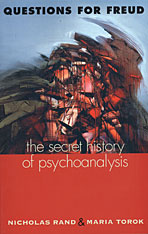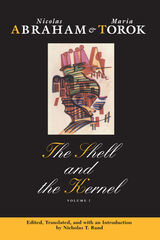
With all the intrigue and twists of a mystery, Questions for Freud uncovers the paradoxes that riddle psychoanalysis today and traces them to Freud's vacillation at key points in his work--and from there to a traumatic event in Freud's life.
What role did censored family history play in shaping Freud's psychological inquiries, promoting and impeding them by turns? With this question in mind, Nicholas Rand and Maria Torok develop a new biographical and conceptual approach to psychoanalysis, one that outlines Freud's contradictory theories of mental functioning against the backdrop of his permanent lack of insight into crucial and traumatic aspects of his immediate family's life. Taking us through previously unpublished documents and Freud's dreams, his clinical work and institutional organization, the authors show how a shameful event in 1865 that shook Freud and his family can help explain the internal clashes that later beset his work--on the origins of neurosis, reality, trauma, fantasy, sexual repression, the psychoanalytic study of literature, and dream interpretation.
Steeped in the history, theory, and practice of psychoanalysis, this book offers a guide to the wary, a way of understanding the flaws and contradictions of Freud's thought without losing sight of its significance. This book will alter the terms of the current debate about the standing of psychoanalysis and Freud.

Central to their approach is a general theory of psychic concealment, a poetics of hiding. Whether in a clinical setting or a literary text, they search out the unspeakable secret as a symptom of devastating trauma revealed only in linguistic or behavioral encodings. Their view of trauma provides the linchpin for new psychic and linguistic structures such as the "transgenerational phantom," an undisclosed family secret handed down to an unwitting descendant, and the intra-psychic secret or "crypt," which entombs an unspeakable but consummated desire. Throughout, Abraham and Torok seek to restore communication with those intimate recesses of the mind which are, for one reason or another, denied expression.
Classics of French theory and practice, the essays in volume one include four previously uncollected works by Maria Torok. Nicholas Rand supplies a substantial introductory essay and commentary throughout. Abraham and Torok's theories of fractured meaning and their search for coherence in the face of discontinuity and disruption have the potential to reshape not only psychoanalysis but all disciplines concerned with issues of textual, oral, or visual interpretation.
READERS
Browse our collection.
PUBLISHERS
See BiblioVault's publisher services.
STUDENT SERVICES
Files for college accessibility offices.
UChicago Accessibility Resources
home | accessibility | search | about | contact us
BiblioVault ® 2001 - 2024
The University of Chicago Press









